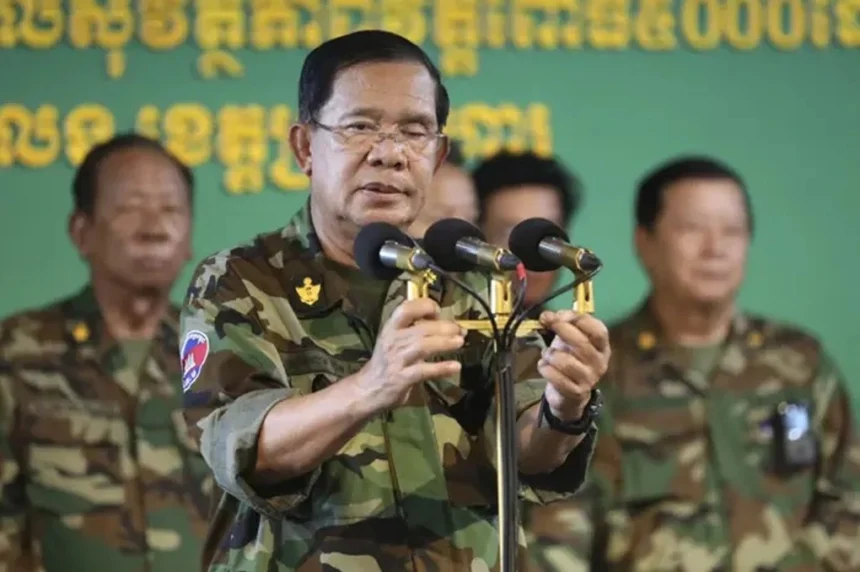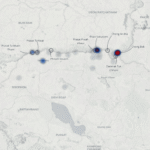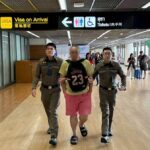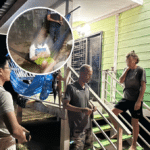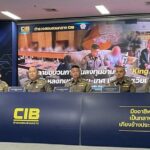BANGKOK — Tensions at the Thailand-Cambodia border have turned into one of Southeast Asia’s most serious standoffs in recent years, with central attention on Hun Sen, former Prime Minister and now President of Cambodia’s Senate.
A leaked phone conversation on 15 June 2025 between Hun Sen and Thailand’s Prime Minister, Paetongtarn Shinawatra, has shaken Thailand’s leadership and increased military tensions in the disputed Emerald Triangle region.
The situation escalated after a Cambodian soldier was killed on 28 May, reigniting the conflict. Observers, including a recent report by the Australian Strategic Policy Institute (ASPI), highlight Hun Sen’s history of corruption, human rights violations, and inflamed nationalism as key factors that have driven the crisis.
A Leaked Conversation Fuels Hostility
The Emerald Triangle, where the borders of Thailand, Cambodia, and Laos meet, has a troubled past rooted in colonial-era border drawing. The latest dispute intensified after Hun Sen made public a private call with Paetongtarn Shinawatra in which she called him “uncle” and appeared to speak out against her military.
Hun Sen played the recording for about 80 Cambodian officials before it leaked, stoking nationalist anger in both countries. Thailand reacted with air raids and closed its border crossings, while Cambodia blocked Thai imports such as fuel, gas, and food, deepening economic hardship for its citizens.
ASPI’s April 2024 report describes how Hun Sen’s government often uses nationalist messaging to tighten support at home, especially during economic hard times or internal dissent.
The report claims that Hun Sen’s recent actions, including moving troops and heavy equipment toward the border, fit his pattern of drawing attention away from Cambodia’s problems by stirring up foreign conflicts.
This approach has served him for decades as he holds on to power through fear, force, and public distractions.
Accusations Over Landmines at the Border
The conflict has also raised fresh concerns about Cambodia’s commitment to the 1997 Ottawa Convention, which bans anti-personnel mines. Thailand accuses Cambodian troops of planting new mines in the disputed zone. If evidence supports this, it would mean Cambodia is breaking its promise under the convention.
ASPI’s analysts used recent satellite images, labelled as “stalactite imagery” due to patterns seen in the pictures, to highlight likely spots where new mines have been laid. These actions, the report finds, show a deliberate effort by Cambodia to strengthen its positions, risking more civilian deaths and making the area more dangerous for everyone.
Cambodia’s record with landmines is grim. Millions of devices remain from conflicts during and after the Khmer Rouge era, especially due to the K5 Plan, a project from the 1980s that forced many Cambodians to build mine-filled defences at the border.
Human Rights Watch has detailed how the K5 Plan caused thousands of deaths, both from mines and poor conditions, a tragedy that still shapes life in rural Cambodia. If the recent claims are proven, it would signal a worrying return to these tactics during Hun Sen’s ongoing influence.
Hun Sen’s Rule and Methods
Hun Sen led Cambodia as prime minister from 1985 to 2023. Rising from the Khmer Rouge ranks before becoming a Vietnamese-backed leader, he took control firmly after a forceful 1997 coup against Norodom Ranariddh, co-prime minister at the time.
His nearly four-decade rule brought some economic growth but was marked by deep corruption, severe environmental damage, and regular crackdowns on rights. The 2015 Human Rights Watch report “30 Years of Hun Sen” outlines his government’s repeated jailing and killing of critics, journalists, and union leaders, keeping most opponents silent through fear.
Hun Sen’s party, the Cambodian People’s Party (CPP), has held power largely by blocking serious political competition, shutting down opposition groups such as the Cambodian National Rescue Party (CNRP) in 2017.
High-profile opponents like Sam Rainsy and Kem Sokha faced jail or exile, and others, including respected analyst Kem Ley, were killed in suspicious circumstances. In the latest chapter, exile leader Lim Kimya was shot dead in Bangkok in January 2025, in a killing blamed by many on Hun Sen’s habit of targeting enemies even abroad.
According to an ASAS report, Hun Sen’s rule is reinforced by networks of loyal supporters, often enriched through land deals and resource licenses. Between 2007 and 2008, roughly 45% of Cambodia’s territory was leased to foreign investors under his watch, displacing over 150,000 people and speeding up deforestation.
A 2009 Global Witness report named Hun Sen in cases of corruption linked to oil and minerals, further increasing poverty among the rural population, while his supporters gained wealth.
Dynasty and Long-Term Control
Hun Sen stepped down as prime minister in August 2023, passing the role to his son Hun Manet in a managed succession. But as President of both the CPP and the Senate since April 2024, Hun Sen keeps a tight grip on the country.
Critics see this transfer and the promotion of family allies to high office as proof of a ruling clique growing even tighter. ASPI’s analysis suggests that Hun Manet, lacking his father’s experience, may end up using more force to control unrest or opposition.
Public fear remains high. In 2023, a Phnom Penh voter told the BBC he felt powerless to criticize the government, describing a climate of spying and punishment. Independent media outlets like The Cambodia Daily have been closed, and social media is tightly watched, leaving many Cambodians wary of speaking openly.
Tensions Spilling Across the Region
The Thailand-Cambodia standoff, now fuelled by nationalist messages and bold moves from Hun Sen, is putting regional cooperation at risk. The leak of the phone call between him and Paetongtarn Shinawatra not only embarrassed her but also ended his long partnership with her father, Thaksin Shinawatra, previously described as his “godbrother”.
On 26 June, Hun Sen threatened Thaksin with more revelations, showing how far personal conflicts can now shape diplomatic ties.
As both countries step up patrols, enforce new trade blocks, and close borders, it’s the people on both sides who suffer most. Cambodia’s halt on Thai goods threatens supplies of essentials, while Thai border closures trap workers and disrupt trade.
The International Crisis Group warns that without easing tensions, there is a real risk of the situation tipping into open conflict, with neither side prepared for the costs. Hun Sen’s style of ruling by fear, corruption, and now this dangerous border dispute continues to overshadow Cambodia’s present and future across Southeast Asia.
The report warns that stoking nationalism and relying on harsh methods puts both Cambodia and the broader region at risk. For now, Southeast Asia watches closely as the possibility of war looms, with Hun Sen’s legacy still hanging over every decision.
Related News:
Cambodia’s Exiled Opposition Leader Exposes Hun Sen’ Lies




